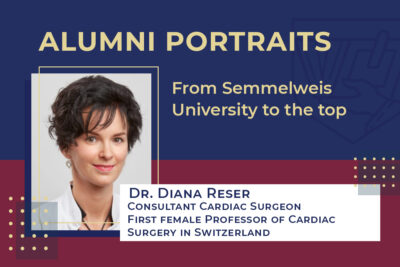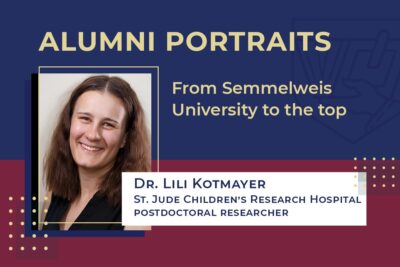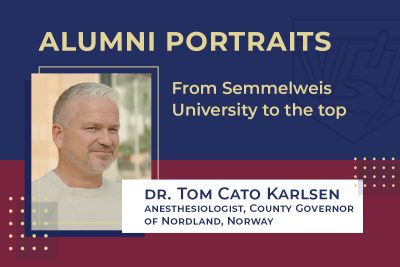What did the Stipendium Hungaricum scholarship at Semmelweis University give you, how did it enrich your journey?
The Stipendium Hungaricum scholarship at Semmelweis University provided me with full tuition, accommodation, health insurance, and a monthly allowance, significantly easing my financial burden. This scholarship allowed me to immerse myself in Hungarian culture, experience the country’s rich history, and benefit from an excellent education system. During my time here, I built lifelong relationships, got married, and started a family. Hungary has become our second home, enriching my personal and professional journey.
What was your most beloved experience during your studies at Semmelweis?
My most beloved experience at Semmelweis was working with children with disabilities, helping them discover their unique abilities. Conductive Education (CE) taught me that every individual is special and can learn in their own way. Assisting these children in finding their path to studying and participating in society was incredibly rewarding.
What made you choose to study a Hungarian course and learn the language?
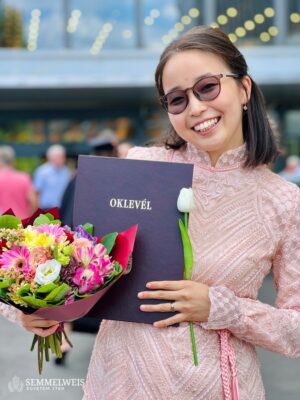 I chose to study a Hungarian course and learn the language because, when I was 18 years old, I set my life goal and established a non-governmental organization in Mongolia to give hope to children with disabilities, and gather them together, show their abilities to society. This was a challenging task due to my young age, lack of resources, and the absence of a relevant profession in my country. To achieve my goal of becoming an educator for children with disabilities, I decided to come to Hungary. Learning Hungarian was essential to pursue the curriculum and fulfill my mission.
I chose to study a Hungarian course and learn the language because, when I was 18 years old, I set my life goal and established a non-governmental organization in Mongolia to give hope to children with disabilities, and gather them together, show their abilities to society. This was a challenging task due to my young age, lack of resources, and the absence of a relevant profession in my country. To achieve my goal of becoming an educator for children with disabilities, I decided to come to Hungary. Learning Hungarian was essential to pursue the curriculum and fulfill my mission.
Do you have any role models in the medical field? If not, what made you go in this direction in your education?
My primary motivation for pursuing this direction in education is my deep love for children and my desire to make a difference where it is most needed. I feel a profound connection with these children, and I believe that their love and need for support align perfectly with my purpose.
Please talk about what motivated you to become a CE teacher and where you are in this journey right now.
The inspiration to become a CE teacher began with my biggest sister, who has a hearing impairment. Witnessing her dedication over the past decade to providing inclusive education and genuine warmth to children with disabilities deeply influenced my career path. Currently, I’m working as a conductor in Hungary, and I have plans to further my education through postgraduate studies in Special and Inclusive Education in the United Kingdom. My ultimate goal is to continue contributing to the advancement of inclusive education and policy development in Mongolia.
Can you elaborate on what you have achieved during your career so far?
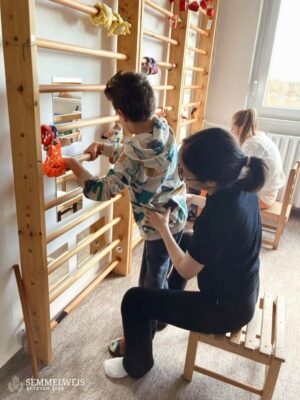 During my six-year journey to become an educator in the field of special education, I’ve undergone significant personal and professional growth. Internally, I’ve matured into a deeply understanding individual, empathetic towards the needs of others. Externally, I’ve acquired the necessary education, skills, and structure to excel as a teacher, wife, and mother. This holistic development is what I consider my most significant achievement thus far.
During my six-year journey to become an educator in the field of special education, I’ve undergone significant personal and professional growth. Internally, I’ve matured into a deeply understanding individual, empathetic towards the needs of others. Externally, I’ve acquired the necessary education, skills, and structure to excel as a teacher, wife, and mother. This holistic development is what I consider my most significant achievement thus far.
Moreover, I’ve accomplished several milestones in my professional career. Before coming to Hungary, as the founder of an organization, I initiated a comprehensive year-long home-based program from 2015 to 2016, providing education and activities in various subjects for children with disabilities. I organized three major social events with the help of ten volunteers and support from five sponsor companies. I conducted an outstanding research project titled “Possibilities of Education, Training, and Development for Individuals with Disabilities in Mongolia” during my bachelor’s studies. This research addressed early challenges in inclusive education in Mongolia and proposed solutions to meet the educational needs of disabled children at a regulatory level. These research outcomes led to the development of short-term training programs and lecture series for specialists in Mongolia. Furthermore, I actively expanded my international network by volunteering with the Tempus Public Foundation in Hungary. Through these experiences, I’ve not only grown as an individual but also contributed to the advancement of special education.
What are your long-term goals careerwise?
My long-term career goal is to establish an educational center in Ulaanbaatar, Mongolia, providing tailored CE for children with disabilities. This center will also serve as a hub for parent support and inclusive culture promotion. In the mid-term, I aim to work as an Education Consultant within the Ministry of Education and Science of Mongolia, focusing on inclusive education policy and program development. Ultimately, I aspire to strengthen Mongolia’s academic landscape by fostering connections with prestigious educational institutions abroad and advancing the country’s inclusive education system throughout my career.
Can you tell us about your experience studying special needs education?
Studying special needs education has been a transformative journey for me. It’s taught me that as a conductor, readiness is key – each day presents unique challenges and joys, but the children always bring happiness. I’ve learned to grow not only in knowledge but also in heart, knowing that my actions will be returned many times over by those I’ve helped. Being open-minded and accepting individuals with motor impairments is crucial in this field.
What advice would you give international students who would like to study in Hungary?
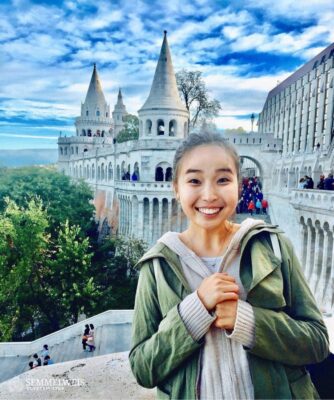 For those studying in Hungary, I would suggest familiarizing yourself with basic Hungarian phrases and local customs to ease your adaptation. Engage actively with professors and classmates, use campus resources such as libraries, and form study groups. Joining clubs and pursuing various activities can help you make friends and integrate better. Take the time to explore Hungary’s cities and landscapes. Also, ensure you budget wisely, have adequate health insurance, and keep your visa and legal documents organized.
For those studying in Hungary, I would suggest familiarizing yourself with basic Hungarian phrases and local customs to ease your adaptation. Engage actively with professors and classmates, use campus resources such as libraries, and form study groups. Joining clubs and pursuing various activities can help you make friends and integrate better. Take the time to explore Hungary’s cities and landscapes. Also, ensure you budget wisely, have adequate health insurance, and keep your visa and legal documents organized.
What would you consider the most crucial factor for someone to achieve their goals and become successful?
Stay persistent and resilient: Keep pushing towards your goals, learn continuously, and adapt when needed. Being present in the moment and managing your time effectively are also essential for success. Finally, prioritize prayer, love, and study, as they lay the foundations for success.
Hanna Szekeres, Alumni Directorate
Photo by Gerel Ganbold

